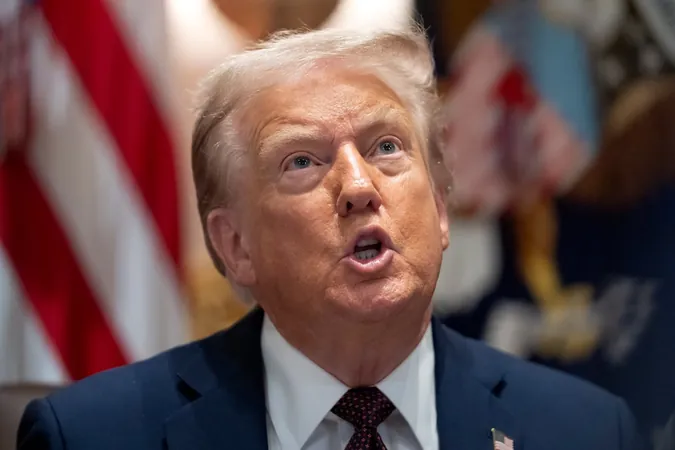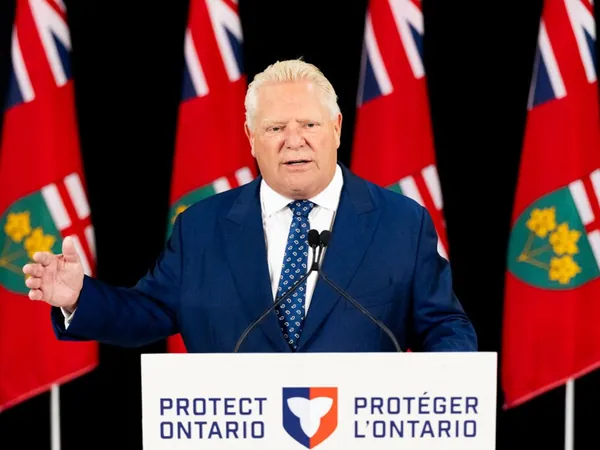
Trump's Tariffs Face Major Setback: What It Means for His Trade Agenda
2025-08-30
Author: Olivia
Trump's Bold Tariff Moves Hit a Legal Roadblock
In a significant ruling, the U.S. Court of Appeals for the Federal Circuit has challenged President Trump's sweeping authority to impose tariffs without congressional approval. The court's decision follows an earlier judgment from a federal trade court that declared Trump overstepped his bounds by leveraging national emergencies to juice up import taxes on global trading partners.
What Tariffs Were Impacted?
The court’s ruling particularly targets tariffs that Trump enacted in April, which affected nearly all U.S. trading partners, as well as specific levies imposed on Canada, Mexico, and China. Initially dubbed "Liberation Day" by Trump, the April 2 tariffs included up to a staggering 50% on nations with whom the U.S. has a trade deficit, alongside baseline rates of 10% on others.
Investor Anxiety Grows
Markets have reacted nervously to Trump's unpredictable tariff strategies, causing financial instability and rising fears of inflation and economic slowdown. While some nations like the UK and Japan negotiated more favorable terms to avoid harsher tariffs, others felt the full brunt, with countries like Laos and Algeria facing crippling rates of 40% and 30%, respectively.
Legal Power Struggle
Trump has defended his tariff policies by arguing that they derive from the International Emergency Economic Powers Act (IEEPA) of 1977, which ostensibly grants him the ability to act in emergencies without congressional consent. However, the court's majority ruled that the IEEPA does not give the President unlimited tariff imposition authority, stating it is unlikely Congress intended such a power delegation.
Where Do We Go from Here?
The implications of this ruling could be far-reaching. If the tariffs are ultimately overturned, the U.S. Treasury might face significant refunds on collected taxes—over $159 billion by July—raising concerns about possible financial repercussions. Trade experts suggest that such a shift could weaken Trump's negotiating stance with foreign nations, potentially emboldening them to resist future trade demands.
Trump's Next Moves
Vowing to escalate his fight to the Supreme Court, Trump asserted that the ruling could lead to the destruction of the United States. While he still possesses alternative legal routes for imposing tariffs, these options would significantly restrict his ability to act swiftly or impose hefty duties as before. For example, the Trade Act of 1974 limits tariffs to 15% and for a maximum of 150 days on countries with trade deficits.
Conclusion: A Pivotal Moment for Trade Policy
As Trump navigates this tumultuous landscape of trade law, the outcome of his appeal could reshape U.S. trade relations and his presidency’s legacy. With significant money at stake and international partnerships hanging in the balance, the stakes have never been higher.









 Brasil (PT)
Brasil (PT)
 Canada (EN)
Canada (EN)
 Chile (ES)
Chile (ES)
 Česko (CS)
Česko (CS)
 대한민국 (KO)
대한민국 (KO)
 España (ES)
España (ES)
 France (FR)
France (FR)
 Hong Kong (EN)
Hong Kong (EN)
 Italia (IT)
Italia (IT)
 日本 (JA)
日本 (JA)
 Magyarország (HU)
Magyarország (HU)
 Norge (NO)
Norge (NO)
 Polska (PL)
Polska (PL)
 Schweiz (DE)
Schweiz (DE)
 Singapore (EN)
Singapore (EN)
 Sverige (SV)
Sverige (SV)
 Suomi (FI)
Suomi (FI)
 Türkiye (TR)
Türkiye (TR)
 الإمارات العربية المتحدة (AR)
الإمارات العربية المتحدة (AR)